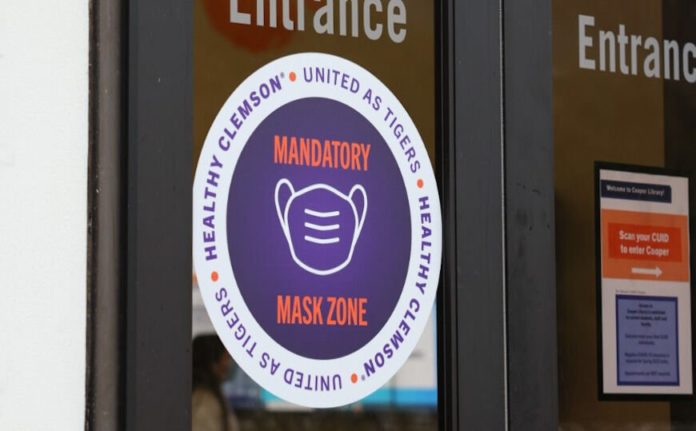Last week, Clemson University announced a temporary mask mandate following a decision by the South Carolina Supreme Court involving the legality of mask mandates at higher education institutions.
On August 2, South Carolina Attorney General Alan Wilson issued a letter to the University of South Carolina, which had previously announced a total mask mandate in all university facilities, opining that the mandate was illegal under a proviso in the state budget for public universities.
“It is important,” wrote Wilson, “that the University not only abide by the Provisos but that it protect the constitutional liberty of students, faculty and staff.”
South Carolina Attorney General Alan Wilson decried USC’s decision to enforce mask mandates and argued that they were illegal under SC law.
The University of South Carolina reversed its mask mandate but maintained previously instituted COVID-19 testing protocols for students returning to campus.
Richard Creswick, a professor at the University of South Carolina, sued the University and Attorney General Wilson after the mask mandate was revoked, asking the state Supreme Court for an expedited hearing before classes began.
The justices accepted the request and on August 17 the court ruled that the proviso “does not prohibit a universal mask mandate.” The state court reasoned that the intent of the proviso was to prevent discrimination toward unvaccinated individuals—not to explicitly prohibit mask mandates as long as they applied equally to vaccinated and unvaccinated students.
The same evening, in accordance with the state court ruling, Clemson University announced a mask mandate for all students and faculty just twelve hours before the start of fall semester classes.
The announcement, sent via email, read, “Clemson will require masks in all of its statewide buildings including classrooms, instructional facilities, offices, labs, and residential and dining halls except while eating or in private spaces. The requirement is effective immediately for a period of three weeks.” Clemson cited a potential spike in COVID-19 cases during the three-week period as its basis for the mandate.
Prior to the South Carolina Supreme Court ruling, Clemson put measures in place to strongly encourage the participation of students and faculty in mitigating the spread of COVID-19. These include a vaccine clinic on campus, monetary incentives to submit proof of vaccination, and required testing.
Move-in for on-campus residents began a week prior to the announcement of the temporary mask mandate, with accessible and required COVID-19 testing for students underway. The ongoing testing requires each student to take a COVID-19 test every seven days compared to every fourteen days for employees. Clemson also released a series of incentives for students and faculty who voluntarily submit proof of vaccination.
The mitigation measures were not enough to satisfy some professors, who threatened a walkout were there to be no mask mandate by the first day of the Fall semester. The “Wednesday walkout” was announced on FaceBook by Kimberly Paul, associate professor of genetics and biochemistry at Clemson. On Twitter, Andrew Pile, associate professor of communication, invited tenured faculty to join the protest and encouraged non-tenured faculty to support the walkout in other ways.
Clemson administration maintains that the temporary mask mandate curbs the rise in COVID-19 cases and the ability to maintain in-person traditional instruction.
The original guidelines for the Fall 2021 semester permitted instructors to request that students wear face coverings in the classroom but not to require them. With the new mandate in place, neither students nor instructors have the choice of whether to use a face covering inside University facilities. Instructors, who sometimes lecture for hours at a time, are mandated to wear a mask for the duration of the class period inside.
Following the announcement of the mask mandate, Clemson students arranged an anti-mask mandate protest on Bowman Field to express their concerns. An official statement from the organizers said the protest was to demonstrate that “students and teachers should be allowed to make the decision themselves if they would like to wear a mask or not.”
Counter-protests also assembled on Bowman, claiming that Clemson University is “following what the scientific community and Covid-19 experts are advising.”
To date, two weeks after move-in and one week after the start of in-person classes, Clemson University has a 0.9% positive test rate of all cumulative test results. The cumulative total includes over 50,000 required weekly and bi-weekly tests for faculty and students.
It is unclear whether the mask mandate will stay in effect following the original three-week period set by Clemson University.








